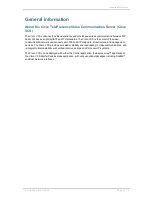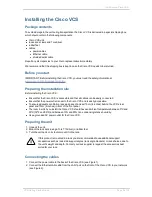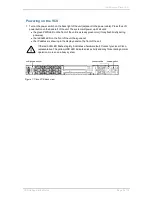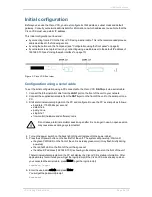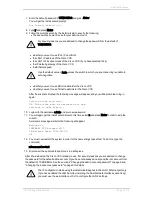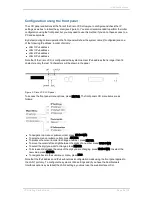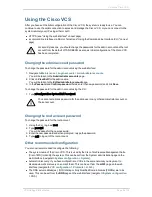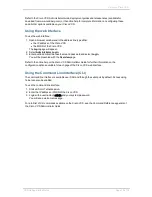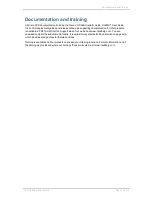
Installing the Cisco VCS
Installing the Cisco VCS
Package contents
To avoid damage to the unit during transportation the Cisco VCS is delivered in a special shipping box,
which should contain the following components:
n
Cisco VCS unit
n
rack ears, screws and Torx driver
n
rubber feet
n
cables:
l
power cables
l
Ethernet cable
l
shielded serial cable
Report any discrepancies to your Cisco representative immediately.
We recommend that the shipping box is kept in case the Cisco VCS needs to be returned.
Before you start
IMPORTANT: Before installing the Cisco VCS, you must read the safety information at
www.cisco.com/go/telepresence/safety
.
Preparing the installation site
Before installing the Cisco VCS:
n
Ensure that the Cisco VCS is accessible and that all cables can be easily connected.
n
Ensure that the power outlet is near to the Cisco VCS and is easily accessible.
n
To ensure adequate ventilation, leave a space of at least 10cm (4 inches) behind the VCS’s rear
panel and 10cm (4 inches) in front of the front panel.
n
The room in which you install the Cisco VCS should have an ambient temperature between 0ºC and
35ºC (32ºF and 95ºF) and between 10% and 90% non-condensing relative humidity.
n
Use a grounded AC power outlet for the Cisco VCS.
Preparing the unit
1. Unpack the unit.
2. Mount the rack ears (using a Torx T10 driver) or rubber feet.
3. Turn the unit back on its feet or mount it in the rack.
If this product is mounted in a rack you are recommended to use additional support
accessories such as rack side support angles (rack angle brackets) or rack shelves, due to
the unit’s weight and depth. Contact your rack supplier to request the accessories best
suited for your rack.
Connecting the cables
1. Connect the power cable to the back of the Cisco VCS (see Figure 1).
2. Connect the Ethernet LAN cable from the LAN1 port on the front of the Cisco VCS to your network
(see Figure 2).
VCS Getting Started Guide
Page 4 of 12



